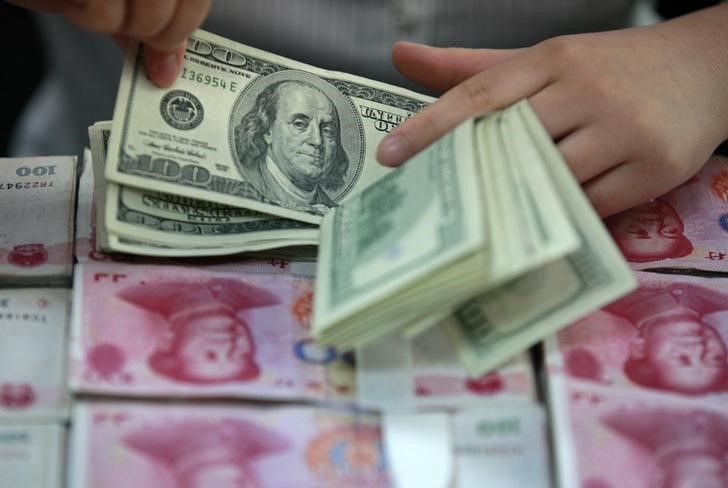
- Financial Times reports that measures taken by Beijing to stem capital flight proved partially effective in December as China's foreign exchange reserves continued to fall but at a slower pace than in previous months.The central bank announced a lower than expected drop in foreign exchange reserves for last month, which fell by $41bn to $3.01tn. A Reuters poll of analysts predicted a $51bn fall for the month after reserves came down by $70bn in November. The People's Bank of China has been anxious to slow the depreciation of the renminbi, which fell 6.6 per cent last year against the dollar. But simply selling off dollars to defend the currency has been expensive — reserves in 2016 fell from $3.3tn to just above $3tn. With an eye on saving reserves, monetary authorities deployed a series of new capital controls at the end of 2016 designed to slow capital outflows. Last week the offshore renminbi jumped 2.6 per cent in two days — its biggest-ever two day gain against the dollar since it was introduced in 2010 — while the onshore rate reached its highest level in more than a month.
The Washington Post reports that lobster lovers are used to adjusting to high prices, but this winter, they're shelling out even more for the cherished crustaceans because of a lack of catch off of New England and Canada and heavy exports to China. Winter is typically a slow season for U.S. lobster fishermen and an active one off Atlantic Canada. But catch is slow in both countries this year, in part because of bad weather, industry sources said. And the winter months are also an important time for exports to lobster-crazy China, which celebrates its New Year holiday Jan. 28. It's increasingly popular to celebrate the Chinese New Year with American lobster. That's causing demand at a time when supply is low. American consumers who were paying $9 to $11 per pound for a live lobster in September — already higher than the previous year — are now sometimes paying upward of $13 per pound. American lobster exports to China have topped 12 million pounds and $85 million in value for three years in a row. The country imported a fraction of that amount as recently as 2010, when it imported less than a million pounds of the crustaceans.
- CNN reports that officials in Beijing are taking steps toward tackling the city's long-standing smog problem with the creation of an environmental police force, according to state media.Spearheaded by Beijing's acting mayor Mayor Cai Qi, the political crackdown on burning fossil fuels comes amid a flurry of concern over the country's choking air pollution.At a meeting on Saturday, the mayor promised to take tougher measures to improve the air quality in the city's 16 districts by 2017, official state media agency Xinhua reported.The new environmental police would among other things, crack down on open-air barbecues, garbage incineration and biomass burning — areas previously overlooked by authorities, Xinhua reported.These recent efforts come amid Beijing's latest spell of smog.
- 2017-01-06 China Doubles Down on Defending Its Currency
- 2017-01-05 China to invest £292bn in renewable power by 2020
- 2017-01-04 With Choice of Trade Negotiator, Trump Prepares to Confront Mexico and China
- 2017-01-03 Wilbur Ross’s Chinese Love Affair
- 2017-01-02 Surge in Chinese corporate investment into the US
- 2016-12-23 In China's Tiny Catholic Community, Hopes Rise For Beijing-Vatican Ties
- 2016-12-22 Trump taps China trade critic Navarro for new White House post
- 2016-12-21 On China: A Conversation With Larry Summers
- 2016-12-20 Smog Chokes Chinese Cities, Grounding Flights, Closing Roads
- 2016-12-19 Donald Trump’s Shock Doctrine Will Make China Even Stronger
- The Guardian Ted Cruz meets Taiwan president and fires his own broadside at China
- Bloomberg China Reserves Slumped $320 Billion Last Year as Yuan Tumbled
- www.aljazeera.com China to launch 'environmental police' force
- Forbes China Wants Russia To Calm India And Save CPEC
- The Washington Post Air China bans shark fin cargo, reflecting dramatic shift in attitudes
- Fortune China is Confident Economy Grew Over Six Percent in 2016
- Wall Street Journal Morgan Stanley and UBS to Increase Stakes in Mainland-China Joint Ventures
- The Guardian Agents and players the real winners in Chinese Super League's spending spree
- CNN A new police beat in China: Smog
- qz.com China's neighbors are getting a whiff of its terrible pollution
- New York Times Choked by Smog, Beijing Creates New Environmental Police
- Financial Times Trump son-in-law held talks with Chinese tycoon
- Forbes VR, Smart Gadgets, China Innovations Break Through All The Hype At CES 2017
- Fox News Taiwan's president heads to US, but won't meet with Trump
- Reuters Sri Lanka launches China-led investment zone amid protests
- Wall Street Journal Clash of the Titans
- Bloomberg How China Can Stop Trumpism
- Financial Times China battles to control growing online nationalism
- The Hill In a US-China trade war, these are America's best options
